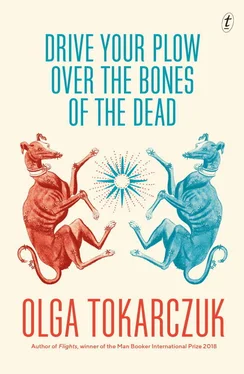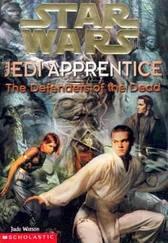Our hamlet consists of a few houses situated on the Plateau, far from the rest of the world. The Plateau is a distant geological cousin of the Table Mountains, their remote harbinger. Before the war our settlement was called Luftzug, meaning ‘current of air’, and nowadays it’s still called that unofficially, because we don’t have an official name. All you can see on the map is a road and a few houses, no letters. It’s always windy here, as waves of air come pouring across the mountains from west to east from the Czech Republic. In winter the wind becomes violent and shrill, howling in the chimneys. In summer it scatters among the leaves and rustles – it’s never quiet here. Many people can afford to have one house in the city, their year-round, official home, and another – a sort of frivolous, childish one – in the country. And that’s how these houses look as well – childish. Small and squat, with steep roofs and tiny little windows. They were all built before the war and they’re all positioned exactly the same way: long walls facing east and west, one short wall facing south, and the other, with an adjoining barn, facing north. Only the Writer’s house is a little more eccentric – it has terraces and balconies built onto it on every side.
It’s no surprise that most people leave the Plateau in winter. It’s hard to live here from October to April, as I know very well. Every year heavy snow falls here, and the wind carves drifts and dunes out of it. Recent climatic changes have made everything warmer, but not our Plateau. Quite the contrary, especially in February, when the snow is heavier and stays put for longer. Several times over the winter the temperature drops to minus twenty, and the season only ends for good in April. The road is poor, the frost and snow destroy whatever the local council tries to repair with its limited expenditure. To reach the asphalt you must drive four kilometres on a dirt road full of potholes, but in any case there’s nothing to be gained from the effort – the bus to Kudowa leaves each morning from down the hill and comes back in the afternoon. In summer, when the few pallid local children have school holidays, the buses don’t run at all. In the village there’s a highway that changes it imperceptibly, like a magician’s wand, into the suburbs of a small town. Should you so wish, you could drive along that highway to Wrocław or to the Czech Republic.
But there are some for whom these conditions are ideal. There’d be lots of Hypotheses to put forward if we wanted to amuse ourselves by looking into it. Psychology and sociology would have plenty of potential lines of enquiry to suggest, but I don’t find the subject in the least bit interesting.
For example, Oddball and I show a bold face to the winter. In any case, what a silly phrase: ‘show a bold face’; in fact we belligerently stick out our lower jaws, like those men on the bridge in the village. If provoked with some unflattering phrase, they respond aggressively: ‘What do you mean by that? Eh?’ In a way, we provoke the winter too, but it ignores us, just like the rest of the world. Old eccentrics. Pathetic hippies.
Here the winter does a beautiful job of wrapping everything in white cotton wool, and shortens the day to the maximum, so that if you make the mistake of staying up too late at night, you might awake in the Gloom of the following afternoon, which – I frankly admit – has been happening to me more and more often since last year. Here the sky hangs over us dark and low, like a dirty screen, on which the clouds are fighting fierce battles. That’s what our houses are for – to protect us from the sky, otherwise it would pervade the very inside of our bodies, where, like a little ball of glass, our Soul is sitting. If such a thing exists.
I don’t know what Oddball does through the dark months, because we’re not in very close contact, though I won’t hide it – I would have hoped for more. We see each other once every few days, and when we do, we exchange a few words in greeting. We didn’t move here for the purpose of inviting each other to tea. Oddball bought his house a year after I bought mine, and it looks as if he’d decided to start a new life, like anyone whose ideas and means for the old one have run out. Apparently he worked at a circus, but I don’t know if he was an accountant there, or an acrobat. I prefer to think he was an acrobat, and whenever he limps, I imagine that long ago, in the beautiful 1970s, during a special act, something happened that caused his hand to miss the bar, and he fell from a height onto the sawdust-sprinkled floor. But on further reflection, I must admit that accountancy isn’t such a bad profession, and the fondness for order that’s typical of the accountant inspires my approval and total respect. Oddball’s fondness for order is plain to see in his small front yard: the firewood for the winter lies piled in ingenious cords arranged in a spiral. The result is a neat stack of golden proportions. Those cords of his could be regarded as a local work of art. I find it hard to resist their beautiful spiral order. Whenever I pass that way, I always stop a while to admire the constructive cooperation of hands and mind, which in such a trivial thing as firewood expresses the most perfect motion in the Universe.
The path in front of Oddball’s house is so very neatly gravelled that it looks like a special kind of gravel, a collection of identical pebbles, hand-picked in a rocky underground factory run by hobgoblins. Every fold of the clean curtains hanging in the windows is exactly the same width; he must use a special device for that. And the flowers in his garden are neat and tidy, standing straight and slender, as if they’d been to the gym.
Now, as Oddball bustled about in his kitchen, I could see how tidily the glasses were lined up in his dresser, and what a spotless cloth lay over the sewing machine. So he even had a sewing machine! Shamefully I pressed my hands between my knees. It was a long time since I had devoted any special care to them. Oh well, I have the courage to admit that my fingernails were quite simply dirty.
As he fetched the teaspoons, for a brief moment his drawer was revealed to me, and I couldn’t tear my eyes away from it. It was wide and shallow like a tray. Inside, carefully arranged in separate compartments, lay all sorts of cutlery and other Utensils needed in the kitchen. Each one had its place, though most of them were quite unfamiliar to me. Oddball’s bony fingers purposefully chose two teaspoons that soon came to rest on willow-green napkins right beside our teacups. A little too late, unfortunately, for I had already drunk my tea.
It was hard to have a conversation with Oddball. He was a man of very few words, and as it was impossible to talk, one had to keep silent. It’s hard work talking to some people, most often males. I have a Theory about it. With age, many men come down with testosterone autism, the symptoms of which are a gradual decline in social intelligence and capacity for interpersonal communication, as well as a reduced ability to formulate thoughts. The Person beset by this Ailment becomes taciturn and appears to be lost in contemplation. He develops an interest in various Tools and machinery, and he’s drawn to the Second World War and the biographies of famous people, mainly politicians and villains. His capacity to read novels almost entirely vanishes; testosterone autism disturbs the character’s psychological understanding. I think Oddball was suffering from this Ailment.
But that day at dawn it was hard to demand eloquence of anyone. We were utterly dispirited.
On the other hand, I felt great relief. Sometimes, when one thinks more broadly, ignoring one’s usual mental preferences, and considers instead the sum total of a Person’s deeds, one might conclude that their life is not a good thing for others. I think anyone would say that I’m right about this.
Читать дальше












